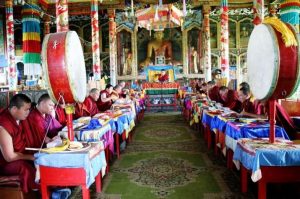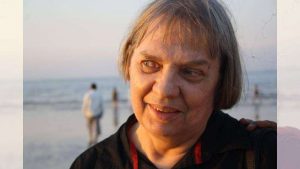
The Korean Seon (Zen) master Venerable Pomnyun Sunim (법륜스님) wears many hats: Buddhist monk, teacher, author, environmentalist, and social activist, to name a few.* As a widely respected Dharma teacher and a tireless socially engaged activist in his native South Korea, Ven. Pomnyun Sunim has founded numerous Dharma-based organizations, initiatives, and projects that are active across the world. Among them, Jungto Society, a volunteer-based community founded on the Buddhist teachings and expressing equality, simple living, and sustainability, is dedicated to addressing modern social issues that lead to suffering, including environmental degradation, poverty, and conflict.
This column, shared by Jungto Society, presents a series of highlights from Ven. Pomnyun Sunim’s writings, teachings, public talks, and regular live-streamed Dharma Q+A sessions, which are accessible across the globe.
The following teaching was given in New Jersey on 17 September 2023. This article is the 17th in a special series taken from Ven. Pomnyun Sunim’s Dharma tour of Europe and North America—his first overseas tour since the pandemic. Titled “Casual Conversation with Ven. Pomnyun Sunim: Come Talk about Life, Wisdom, and Happiness” the Dharma tour ran from 1–22 September 2023, taking in 21 cities: six in Europe and 15 in North America.**

This Dharma talk was held at the Korean Community Center, in Tenafly, New Jersey, which was established to help Korean immigrants to the United States overcome cultural and language barriers and to serve as a bridge with American society.
Finding a Path to Peace
Ven. Pomnyun Sunim: During the coronavirus pandemic, I lived farming every day at a disused school near Gyeongju City [in South Korea]. My dream is to live by farming as I grow older and retire, so it felt like the pandemic had brought early retirement to me. Living in the countryside and farming is great because I get some exercise. I’ve been to a lot of places throughout my life, so I’ve rarely slept in the same room for two nights in a row. But I spent three years like that as a farmer, to the point where I think it was the longest I had slept in one place since graduating from elementary school!
How have you all been doing? (audience laughter)
The reason I’m visiting the US this time is not only to talk with you here today, but also to make efforts to ease tensions on the Korean Peninsula by visiting Washington, DC, for a week.
Tensions on the Korean Peninsula are at a critical level. South Korea is engaging in military cooperation with Japan and the US, saying that it will not tolerate any provocation, and is mobilizing strategic assets and threatening North Korea with cutting-edge weapons. North Korea is threatening South Korea that it may use nuclear weapons as actual attack weapons, and is accelerating the development of nuclear weapons and intercontinental ballistic missiles. In this situation, if Russia were to provide military technology to North Korea, there is a significant risk of rapid proliferation—not only of North Korea’s conventional weapons but also of weapons of mass destruction.
This situation could cause a catastrophe on the Korean Peninsula incomparable with the war in Ukraine, so it is desperately necessary for us living in this country to prevent such a catastrophe.
I believe that what can have the greatest influence here is the US government’s East Asia policy. However, thinking that we can persuade the US to act for our own interests is nothing but a delusion. We need to persuade the US that it would be good to bring peace to the Korean Peninsula for the interests of the US.
Military cooperation between North Korea and Russia poses a great threat, not only to South Korea but to the national interests of the US and the security of Japan. Therefore, by normalizing relations between North Korea and the US, it is advantageous for the national interest of the US to take measures to freeze North Korea’s development of nuclear weapons. Of course, I believe it would be best if the South Korean government takes the lead in efforts for peace on the Korean Peninsula. However, if you look inside South Korea, it is adopting a hardline policy toward North Korea for various political reasons.
If you look around the world these days, not only are rivalries between countries fierce, but rivalries between domestic political parties are likewise also very fierce. In the past, we cooperated and competed with each other, but now we are competing as if we were in a civil war. The US seems to have a stronger tendency to do this, and so does South Korea. This isn’t necessarily the fault of any one government, but can be seen as a common crisis among democratic countries. It’s not only South Korea and the US; conflicts are escalating globally. In such situations, taking sides or blaming individuals won’t provide any solutions. We need to find ways to ease these dangerous situations. Efforts must be made to at least prevent war from breaking out.
In particular, North Korean residents are the ones who suffer the most from this conflict. They are starving due to food shortages, and their freedom is being suppressed in the name of a national crisis. This situation has been continuing for far too long. I hope to make it our mission to find ways to alleviate the suffering of North Korean residents, even a little.
In fact, it is not very effective for a foreigner like me to meet and talk with political figures in the US. What do US lawmakers need most? Firstly, they need votes, and secondly, they need money. So those of you who are US citizens should collect donations and send them while requesting peace on the Korean Peninsula. Also, using your voting rights to demand, “If you do well, we may support you,” can move them even a bit. In that regard, the efforts of one US citizen can have a greater impact than the efforts of a thousand in South Korea. So if you feel grateful for my Dharma Talk and want to reciprocate, I would like to suggest that you become more actively involved in the voter movement for peace on the Korean Peninsula.
Caring for My Father
Q: My mother passed away after undergoing dialysis for 17 years due to complications from diabetes and heart problems. As I was in charge of taking care of my mother, I had to watch her go through so many hardships. When she passed away, honestly, rather than feeling sad, I felt more relief for my mother, knowing that she was free from pain.
But now it’s my father’s turn. He recently suffered a stroke and has developed dementia. The problem is that I’m not as healthy as I used to be. I’m not sure how I will be able to cope with my father in the future.
Of course, there are other family members besides me. My older brother is helping me a lot, and my nephew is also taking good care of his grandfather. But my heart feels so tired. What should I do?
Ven. Pomnyun Sunim: Taking care of your father may be a burden, but it seems to be even more difficult because your mental health is not good. It would be good for you to take care of your father if you’re healthy, but since your health is not good, it would be better to leave the care of your father to your brother. I think it would be good for you to do more self-care and address your mental health.
Q: I am undergoing treatment. I’m taking my medication as prescribed.
Ven. Pomnyun Sunim: You are also a patient, so it’s a bit difficult for a patient to take care of another patient.
Q: Fortunately, I don’t hate my father yet. But I’m afraid that there will come a time when I end up hating him.
Ven. Pomnyun Sunim: If you do not take care of your father, you won’t end up hating him.
Q: But you see, I have no choice but to take care of my father. He is my father.
Ven. Pomnyun Sunim: Why do you have to do it? If you feel that way, that’s your problem. You don’t have to provide care. Thinking that you have to take care of him because he’s your father is only your opinion. It’s a choice you make, not an obligation.
Q: Then who will take care of my father?
Ven. Pomnyun Sunim: Your brother will probably do it. You can tell your brother that it’s difficult for you to care for your father because your health is not good. It’s a choice you can make; not a problem that arises from having to care for your father.
Q: Is it really okay for me not to take care of my father?
Ven. Pomnyun Sunim: You don’t have to do it. There is no problem if you don’t take care of your father. If we look at it from a natural perspective, when a mother gives birth to a baby, it goes against the laws of nature not to care for the baby. All living beings have a survival instinct to protect their own lives, so every creature must take responsibility for its own life.
However, when any living thing has a baby, the mother must take care of it until it becomes an adult. This is maternal love. Maternal love is an instinct for the preservation of the species. Without maternal love, a species cannot be sustained. So when a woman is alone, her own life is the most important, but when she gives birth to a baby, the mother sacrifices her own life to save the baby.
In the case of birds, if a predator attacks while the young are present, the mother will risk her life to protect them. Hens usually run away when people approach, but when they are with their chicks, they never flee but flap their wings and confront people. This is a life instinct. Without that instinct, a species cannot be maintained.
If a woman says, “I can’t give birth to a baby and raise it,” that is her thought before giving birth. But when she gives birth to her baby, her natural instinct to protect her baby kicks in. If there is someone who doesn’t, she has paralyzed instincts. In modern society, some people become so consumed by their careers and desires that their instincts become paralyzed. Nowadays, occasionally, we see such people emerging. However, prioritizing one’s work over a baby and neglecting the child goes against the laws of nature.
On the other hand, when a cub becomes adult, the mother and the cub lead independent lives. In natural ecosystems, there are no instances where a mother continues to follow her offspring, and there are no cases where an offspring follows a mother. Each is an independent life. Each entity is responsible for its own life. So in a natural ecosystem, there is no conflict between the mother and the offspring.
Not caring for a baby after giving birth can be seen as a mental disorder. Yet when the child has become an adult, a mother’s continued efforts to protect it can be seen as obsession. If a child relies on his or her parents even after reaching adulthood, it is because of dependency. If a child cannot overcome this dependence on their parents, they will not become independent from their parents even when they become an adult, and will always have to live under the interference of their parents. Likewise, if parents cannot let go of their attachment to their children, they will always live with a heavy burden. This is against the natural way of things. Going against nature in this way causes suffering.
Likewise, caring for your parents is a matter of choice, not obligation. Caring for one’s children is an obligation because it’s a natural principle. However, in the natural world, offspring do not take care of their aging parents. This is something that only exists in human society. If you can do it, it’s called filial piety, but if you can’t, that’s okay too. Hitting or abusing your parents is unfilial, however not caring for your parents is not unfilial.
Especially in the case of someone like you, who has poor health and cannot easily care for their parents, there’s no need to feel any guilt. However, if you cannot stop taking care of your parents, despite not wanting to, that is your own attachment. In fact, you’re doing it because you want to, so there’s no need to suffer.
The reason you ask, “How can I take care of my father no matter how sick I am?” is because you are so attached. As a result, if you fall ill it’s because you chose it, so there’s no reason to blame your father. There’s no reason to hate your father either. If it’s too hard, you can simply choose not to do it. Hating your father while taking care of him is a foolish act. If you’re going to hate your father, it’s better not to take care of him.
Q: I’m trying to do that.
Ven. Pomnyun Sunim: There is nothing to try. If it’s too much for you, don’t do it. When it’s too much for you, you unconsciously start to think things like, “I wish my father would die quickly.” If you keep thinking that way because it’s difficult, you’ll become unfilial. So there’s a risk that your care for your father could become unfilial if you’re not careful.
Q: Then is it okay if I don’t take care of my father?
Ven. Pomnyun Sunim: Of course!
Q: Thank you.
Are You Happy?
Q: Are you happy, Sunim?
Ven. Pomnyun Sunim: Yes!
If you understand happiness as pleasure, behind that happiness there will inevitably be suffering. In our Buddhist practice, happiness means being free from suffering. You are not healthy only when you run fast and are strong; you are healthy when you are not sick. As such, if there’s no suffering, that is happiness. I can say I’m happy because I’m not experiencing any particular distress. But please don’t stab me in the side with a knife and ask, “Isn’t this bothering you?”
Suffering arises moment by moment, but I don’t hold onto it, hate it, resent it, or regret it. Even if our fundamental ignorance is resolved, ignorance arises momentarily. This is because we momentarily revert to our past habits. You may feel angry, irritated, or sad, but it shouldn’t last long. There’s an old saying:
When the wind blows, the leaves shake; when the wind sleeps, the leaves also sleep.
However, sometimes, even when the wind sleeps the leaves continue to shake. If you have been hurt and you keep it in your memory, it hurts you when you think about it. This suffering has nothing to do with the person who hurt you and is of your own making. This is foolishness.
The Buddha said: “You may be hit by the first arrow, but don’t be hit by the second arrow.” If you feel angry because someone hits you, you have been hit with the first arrow. However, continuing to feel angry while thinking about the past is like being hit by a second arrow. It would be best if you aren’t hit by the first arrow, but as you live this may well happen. However, you shouldn’t allow the second arrow to hit you.
Your karma doesn’t change just because you marry, become a monk or nun, or visit a church or a temple. If you are having difficulties while living in Korea, it might seem like they will be resolved by moving to the US; if you are living alone and having difficulties, it might be resolved by marrying; and if you are having difficulties after marrying, it might be resolved by divorcing, right?
It may seem like it’s resolved for a moment, but it doesn’t really work that way.
What’s essential is that you examine the workings of your own mind—which collide with external boundaries—and liberate yourself from there. Only then can you live freely and without suffering, regardless of where you go, whom you meet, what you do, or whether you live alone or with someone.
This has nothing to do with what religion you believe in. So I hope that you all engage in mental cultivation, value yourself, and live a happier life day by day.
* Buddhist Monk Ven. Pomnyun Sunim Awarded the 37th Niwano Peace Prize (BDG)
See more
Pomnyun
Jungto Society
JTS Korea
JTS America
International Network of Engaged Buddhists
Related features from BDG
The Path without Suffering
Be Free from Suffering
Living a Life without Suffering
Live Life Lightly
Prostrating as a Part of Buddhist Practice
Suffering and the Significance of Insignificance
Treasure the Present and Value Your Own Life
Free Will and Freedom from Suffering
Do Not Sacrifice Later for Now
Begin Life Now
Becoming the Master of Your Own Life
You Are Alive Today
Everyone Has the Right to be Happy
Personal Action to Mitigate the Climate Crisis
Awareness, the Beginning of Change
How to Live Life More Freely
Related videos from BDG
Dharma Q+A with Ven. Pomnyun Sunim
Wisdom Notes from Ven. Pomnyun Sunim


























